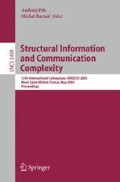Abstract
Suppose that some parties are connected by an incomplete network of reliable and private channels. The parties cooperate to execute some protocol. However, the parties are curious – after the protocol terminates each processor tries to learn information from the communication it heard. We say that a function can be computed privately in a network if there is a protocol in which each processor learns only the information implied by its input and the output of the protocol. The question we address in this paper is what functions can be computed privately in a given incomplete network. It is known that if a network is 2-connected then every pair of parties can communicate privately. Thus, the question is interesting only for non-2-connected networks. We first characterize the functions that can be computed privately in simple networks – networks with one separating vertex and two 2-connected components. We then deal with private computations in arbitrary networks: we reduce this question to private computations of related functions on trees, and give sufficient and necessary conditions on the functions that can be computed privately on trees.
Partially supported by the Lynn and William Frankel Center for Computer Sciences.
Access this chapter
Tax calculation will be finalised at checkout
Purchases are for personal use only
Preview
Unable to display preview. Download preview PDF.
References
Beimel, A., Franklin, M.: Reliable communication over partially authenticated networks. Theoretical Computer Science 220, 185–210 (1999)
Beimel, A., Malka, L.: Efficient reliable communication over partially authenticated networks. In: The 22nd PODC, pp. 233–242 (2003)
Ben-Or, M., Goldwasser, S., Wigderson, A.: Completeness theorems for noncryptographic fault-tolerant distributed computations. In: The 20th STOC, pp. 1–10 (1988)
Bläser, M., Jakoby, A., Liśkiewicz, M., Manthey, B.: Private computation – k-connected vs. 1-connected networks. In: Yung, M. (ed.) CRYPTO 2002. LNCS, vol. 2442, pp. 194–209. Springer, Heidelberg (2002)
Bläser, M., Jakoby, A., Liśkiewicz, M., Manthey, B.: Privacy in non-private environments. In: Lee, P.J. (ed.) ASIACRYPT 2004. LNCS, vol. 3329, pp. 137–151. Springer, Heidelberg (2004)
Bollobás, B.: Modern Graph Theory (1998)
Chaum, D., Crépeau, C., Damgård, I.: Multiparty unconditionally secure protocols. In: The 20th STOC, pp. 11–19 (1988)
Chor, B., Kushilevitz, E.: A zero-one law for Boolean privacy. SIDMA 4(1), 36–47 (1991)
Desmedt, Y., Wang, Y.: Secure communication in multicast channels: The answer to Franklin and Wright’s question. J. of Cryptology 14(2), 121–135 (2001)
Desmedt, Y.G., Wang, Y.: Perfectly secure message transmission revisited. In: Knudsen, L.R. (ed.) EUROCRYPT 2002. LNCS, vol. 2332, pp. 502–517. Springer, Heidelberg (2002)
Dolev, D.: The Byzantine generals strike again. J. of Algorithms 3, 14–30 (1982)
Dolev, D., Dwork, C., Waarts, O., Yung, M.: Perfectly secure message transmission. J. of the ACM 40(1), 17–47 (1993)
Dwork, C., Peleg, D., Pippenger, N., Upfal, E.: Fault tolerance in networks of bounded degree. SIAM J. on Computing 17(5), 975–988 (1988)
Fischer, M.J., Lynch, N.A., Merritt, M.: Easy impossibility proofs for distributed consensus problems. Distributed Computing 1(1), 26–39 (1986)
Franklin, M., Wright, R.N.: Secure communication in minimal connectivity models. J. of Cryptology 13(1), 9–30 (2000)
Franklin, M., Yung, M.: Secure hypergraphs: privacy from partial broadcast. In: The 25th STOC, pp. 36–44 (1993)
Goldreich, O., Goldwasser, S., Linial, N.: Fault-tolerant computation in the full information model. In: The 32nd FOCS, pp. 447–457 (1991)
Jakoby, A., Liskiewicz, M., Reischuk, R.: Private computations in networks: Topology versus randomness. In: Alt, H., Habib, M. (eds.) STACS 2003. LNCS, vol. 2607, pp. 121–132. Springer, Heidelberg (2003)
Kumar, M.V.N.A., Goundan, P.R., Srinathan, K., Pandu Rangan, C.: On perfectly secure communication over arbitrary networks. In: The 21st PODC, pp. 193–202 (2002)
Kushilevitz, E.: Privacy and communication complexity. SIDMA 5(2), 273–284 (1992)
Lynch, N.A.: Distributed Algorithms. Morgan Kaufman Publishers, San Francisco (1997)
Menger, K.: Allgemeinen kurventheorie. Fund. Math. 10, 96–115 (1927)
Rabin, T., Ben-Or, M.: Verifiable secret sharing and multiparty protocols with honest majority. In: The 21st STOC, pp. 73–85 (1989)
Sayeed, H.M., Abu-Amara, H.: Efficient perfectly secure message transmission in synchronous networks. Information and Computation 126, 53–61 (1996)
Srinathan, K., Vinod, V., Pandu Rangan, C.: Efficient perfectly secure communication over synchronous networks. In: The 22nd PODC, p. 252 (2003)
Srinathan, K., Vinod, V., Pandu Rangan, C.: Optimal perfectly secure message transmission. In: Franklin, M. (ed.) CRYPTO 2004. LNCS, vol. 3152, pp. 545–561. Springer, Heidelberg (2004)
Upfal, E.: Tolerating a linear number of faults in networks of bounded degree. Information and Computation 115(2), 312–320 (1994)
Author information
Authors and Affiliations
Editor information
Editors and Affiliations
Rights and permissions
Copyright information
© 2005 Springer-Verlag Berlin Heidelberg
About this paper
Cite this paper
Beimel, A. (2005). On Private Computation in Incomplete Networks. In: Pelc, A., Raynal, M. (eds) Structural Information and Communication Complexity. SIROCCO 2005. Lecture Notes in Computer Science, vol 3499. Springer, Berlin, Heidelberg. https://doi.org/10.1007/11429647_4
Download citation
DOI: https://doi.org/10.1007/11429647_4
Publisher Name: Springer, Berlin, Heidelberg
Print ISBN: 978-3-540-26052-3
Online ISBN: 978-3-540-32073-9
eBook Packages: Computer ScienceComputer Science (R0)

